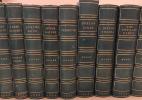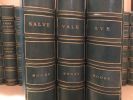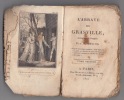69 books for « moore george »Edit
-
Type
Book (68)
Music sheets (1)
-
Language
English (2)
French (67)
-
Century
18th (1)
19th (5)
20th (44)
21st (1)
-
Countries
Belgium (4)
Canada (1)
Denmark (1)
France (59)
Switzerland (4)
-
Syndicate
ALAC (1)
CLAM (1)
CLAQ (1)
ILAB (45)
SLAM (42)
Topics
- Aesthetics (1)
- Autographs (1)
- Blake william (1)
- Children’s books (1)
- English (3)
- English literature (1)
- First edition (1)
- Foreign literature (2)
- Hebraic literature (1)
- Illustrated books (1)
- Judith (1)
- Literature (4)
- Memories (1)
- Moore george (24)
- Moore thomas (3)
- Music (1)
- Newton (1)
- Philosophy (2)
- Quebec (1)
- Review (1)
- Scores (1)
- Songs (1)
- Tea (1)
- Witchcraft (1)
Principia Ethica. - [FOUNDING ANALYTIC PHILOSOPHY - INTRODUCING THE NATURALISTIC FALLACY]
Cambridge, 1903. 8vo. Orig. brown full cloth with gilt lettering to spine. Gilt armorial centre-piece to front board (indicating that this was a prize from ""Coll. di Joh. Bapt.""). A bit of bumping to capitals and corners, otherwise fine. Inner hinges slightly weak and a few marginal pencil annotations. XXVII, (1), 232 pp.
First edition of Moore's seminal magnum opus, his hugely influential ""Principia Ethica"", which helped found analytic philosophy and introduced and named the ""naturalistic fallacy"". ""Moore's ""Principia Ethica"" (1903) is a landmark in the history of ethics. Its impact and influence on subsequent ethical theory, at least in Anglo-American philosophy, have been tremendous. Its specific doctrines of the indefinability of good and of the naturalistic fallacy, whether reinforced, amended, or even rejected, by later theorists, have served as the starting points of much of twentieth century philosophy."" (Morris Weitz, 20th-Century Philosophy: The Analytic Tradition, (1966), p. 68).George Edward Moore (1873-1958) is one of the most influential twentieth century philosophers, and his contributions to analytic philosophy can be compared only to those of Russell, Wittgenstein, and Frege, with whom he founded this philosophical discipline. His impact on Anglo-American philosophy in the 20th century is unsurpassed. ""Principia Ethica"" is the most important of Moore's works. In this work, he makes use of analysis to establish the main doctrines of the book, and thereby lays one of the cornerstones of analytic philosophy. Moore here applies logic to ethics and shows us how this can provide a better foundation for ethics. Moore begins by showing that analysis will reveal to us that ""good"" is a simple, non-natural, and indefinable property, which cannot itself be defined and analyzed, because it is not a complex object that can be divided, but a simple object of thought and goes on to define ethics as an inquiry into what is good. He furthermore shows how sometimes false premises in the definition of good lead to false conclusions about ethical behavior and he introduces his seminal concept ""naturalistic fallacy"", which is defined as the error of assuming that ""good"" can be defined by naming various properties of things which we believe to be good. ""Naturalism"", according to Moore falsely assumes to have defined ""good"" and is therefore unable to provide any logical reason for any principle of ethics.""It appears to me that in Ethics, as in all other philosophical studies, the difficulties and disagreements, of which history is full, are mainly due to a very simple cause: namely to the attempt to answer questions, without first discovering precisely WHAT question it is which you desire to answer. "" (Moore, Preface, p. VIII). ""The influence [of ""Principia Ethics""] was not only overwhelming"" it was exciting, exhilarating, the beginning of a renaissance, the opening of a new heaven on a new earth, we were the forerunners of a new dispensation, we were not afraid of anything."" (Keynes).
Solitude du Kerith The Brook Kerith... 3e dition
Gnrique Broch D'occasion bon tat 01/01/1927 150 pages
Confessions d'un jeune anglais
1925 Paris, Stock, 1925, In douze, 305 pp, broché,très bon état,
1/2200 ex num tiré sur Alfa satiné d'Outhenin-Chalandre. Coll. "Le Cabinet cosmopolite", n°1.
Mémoires de ma vie morte
1928 Paris, Grasset, 1928, In douze, 288 pp, broché, couverture défraichie, dos cassé, papier jauni,
Traduit de l'anglais par G. Jean-Aubry. Avec dédicace du traducteur.
Mémoires de ma vie morte
2009 Paris, Grasset, 2009, In huit, 257, pp, état neuf car service de presse
Collection "Cahiers Rouges" Traduit de l'anglais par G. Jean-Aubry.
Confessions d'un jeune Anglais
1935 Paris, Stock, 1935, 12 x 19 cm, 305 pp, broché, recouvert de papier cristal, en très bon état,
Avec une dédicace d'un Lieutenant t Miel en première page,.
A Mummer's Wife (1885) ; A drama in Muslin (1886) Frontispice de Jacques-Émile BLANCHE; A Mere Accident (1887) ; Spring Days (1888) ; Esther Waters (1894) ; Celibates (1895) ; Evelyn Innes (1898) ; Sister Teresa (1901) ; The Untilled Field (1903) ; The Lake (1905) ; Memoirs of my dead life (1906) ; The Apostle (1914) ; Elizabeth Cooper (1913) ; Hail and Farewell "Ave" (1911) "Salve" (1912) "Vale" (1914).
London Vizetelly & Co, Walter Scott LTD, Fisher Unwin, William Heineman, Maunsel and Co 1885 London, Vizetelly & Co, Walter Scott LTD, Fisher Unwin, William Heineman, Maunsel and Co, 1885-1914, 16 volumes in-8, chagrin vert, titre et auteur sur le dos à 5 nerfs, date en queue, tête dorée, large dentelle intérieure dorée, ex-libris.
George Moore (1852-1933) est un romancier, poète, auteur dramatique, critique d'art et artiste irlandais. Son oeuvre littéraire est influencée par ses années parisiennes, passées à l'Académie Jullian, et ses fréquentations avec les artistes et les écrivains de l'époque (Manet, Pissaro, Renoir, Degas... Baudelaire, Mallarmé, Tourgueniev, les Frères Goncourt, Daudet...). Dans les années 1880, à son retour en Irlande, il abandonne la peinture pour se consacrer à l'écriture et participer au renouveau littéraire Irlandais en écrivant des romans dits "Réalistes". Certains d'entre eux seront censurés car ils abordent des thèmes interdits comme la prostitution, l'alcoolisme, le saphisme, les relations extra conjugales... Auteur prolifique et avant-gardiste, il promeut l'impressionnisme et la littérature réaliste en Angleterre. Bel ensemble de cette importante réunion de 16 volumes en anglais dont de nombreuses dans leur édition originale. Infimes usures et infimes déchirures.
Mémoires de ma vie morte.
Paris Grasset, "Les cahiers verts" 1922 1 vol. broché in-12, broché, 246 pp. (petit pli angulaire à la couverutre). Edition orignale française numérotée sur vergé Bouffant. Traduction G. Jean-Aubry. Bon exemplaire.
L'abbaye de Grasville traduction française réalisée par B. Ducos.Tome 1 seul
Paris chez Maradan, 1810, 10x17,5cm, 1/3 volumes broché,dos factice. Édition de la traduction française réalisée par B. Ducos. Ouvrage illustré 1 gravure en frontispice des volumes.
Remise de 20% pour toutes commandes supérieures à 200 €
Confessions d'un jeune Anglais.
Paris Stock, coll. "Le Cabinet cosmopolite" 1925 1 vol. broché in-8, broché, 305 pp. Edition originale française numérotée sur vélin satiné Outhenin-Chalandre. Bon état.
Esther.
Editions du Siècle, "Les maîtres étrangers" 1933 1 vol. broché in-12, broché, XII-420 pp. Couverture un peu insolée, sinon bon état.
Le Lac. Préface d'Edmond Jaloux. Traduit de l'anglais par Mme W. Laparra.
Paris, Librairie Stock, Cabinet Cosmopolite, Collection Le Cabinet Cosmopolite, 1923. Petit in-8, XXXV-(préface)- 309 pp, broché, couverture imprimée en deux tons. (Masereel).
Photos sur demande.
Confessions d'un Jeune Anglais. Traduit de l'anglais.
Paris, Librairie Stock, Delamain et Boutelleau, Cabinet Cosmopolite, n° 1, 1925. In-12, broché, (2)-ff (avant-propos), 305 pp., couverture imprimée. (Masereel).
Bel ex imprimé et numéroté sur Alfa satiné. Photos sur demande.
MEMOIRES DE MA VIE MORTE
Librairie Grasset. 1922. In-12. Relié demi-cuir. Etat d'usage, Couv. convenable, Dos satisfaisant, Intérieur acceptable. 246 pages. Titre et filets dorés sur le dos. Plats de l'ouvrage broché conservés. Bords des plats frottés. Légère mouillure sur la tranche.. . . . Classification Dewey : 94.41-Editions numérotées (gros tirage)
'Les Cahiers verts', 13, sous la dir. de Daniel Halévy. Galanteries, Méditations, Souvenirs, etc., par G. Moore. Ouvrage tiré à 5.500 exemplaires num. sur Vergé bouffant. Ex. n° 5.265. Classification Dewey : 94.41-Editions numérotées (gros tirage)
Translate Or Communicate
NOVA SCIENCE PUBLISHERS INC (8/1997)
LIVRE A L’ETAT DE NEUF. EXPEDIE SOUS 3 JOURS OUVRES. NUMERO DE SUIVI COMMUNIQUE AVANT ENVOI, EMBALLAGE RENFORCE. EAN:9781560724186
Albert nobbs et autres vies sans hymen
Mercure de france 1971 233 pages in8. 1971. Broché. 233 pages. une ancienne étiquette de bibliothèque au dos avec marques de scotch intérieur TB
Bon Etat
Bibliographical Notes on Witchcraft in Massachusetts, Read before the American Antiquarian Society: April, 25th, 1888.
Montréal Osiris Publications 1973 In-8, 31p. Couverture imprimée.
:: Facsimilé. Reprint de cette brochure publiée en 1888, par l'auteur, à Worcester. Tirage limité à 100 exemplaires (no 17) sur beau papier. :: Agrafé, Bel état.
Judaism in the first centuries of the christian era. The age of the Tannaim. Volume 3: Notes
Cambridge, Harvard University Press 1948 xi + 206pp., 22cm., hardcover (editor's blue cloth with gilt lettering), good condition, R78666
Mémoires de ma vie morte - Galanteries, méditations, souvenirs, soliloques et conseils aux amants avec des réflexions variées sur la vertu et le mérite - Collection les cahiers verts n°13 - Exemplaire n° 1726 sur vergé bouffant.
Bernard Grasset. 1922. In-12. Broché. Etat d'usage, Couv. légèrement passée, Coiffe en pied abîmée, Papier jauni. XXII + 246 pages - coiffes abîmées.. . . . Classification Dewey : 94.4-Editions numérotées
Exemplaire n° 1726 sur vergé bouffant - Collection les cahiers verts n°13 - Traduit de l'anglais par G.Jean-Aubry. Classification Dewey : 94.4-Editions numérotées
Esther - roman - Collection Les Maitres Etrangers
Editions du Siècle. 1933. In-12. Broché. Etat d'usage, Tâchée, Dos abîmé, Pliures. 420 pages, traduit par Daniel Halévy et Mlle Laparra.. . . . Classification Dewey : 820-Littératures anglaise et anglo-saxonne
"Collection "" Les Maitres Etrangers "". Classification Dewey : 820-Littératures anglaise et anglo-saxonne"
DUTANT & ENGEL (textes réunis par) Dutant, Julien; Sosa, Ernest; Stroud, Barry; Williamson, Timothy; Zagzebski, Linda; BonJour, Laurence; Chisholm, Roderick M.; Gettier, Edmund L.; Goldman, Alvin I.; Lehrer, Keith; Moore, George Edward; Nozick, Robert and Engel, Pascal
Reference : 49403
PHILOSOPHIE DE LA CONNAISSANCE. Croyance, connaissance, justification.
Paris, Librairie Philosophique J. Vrin, 2005, in-8 broché, 448 pp. TRES BON ETAT
Nombreux titres disponibles en Philosophie.
Mémoires de ma Vie Morte. Galanteries, Méditations, Souvenirs, Soliloques et Conseils aux Amants avec des Réflexions Variées sur la Vertu et le Mérite
Paris, 1922, in-8, 246pp, reliure demi-basane, Très bel exemplaire 246pp
Esther Waters
Oxford university press. 1964. In-16. Relié. Bon état, Couv. convenable, Dos satisfaisant, Papier jauni. 395 pages. Texte en anglais. Ex-libris à l'encre en page de garde. Quelques rousseurs. Titre et auteur en doré au dos.. . . . Classification Dewey : 420-Langue anglaise. Anglo-saxon
"Introduction par Graham Hough. ""The world's classics""N°594 Classification Dewey : 420-Langue anglaise. Anglo-saxon"
 Write to the booksellers
Write to the booksellers










